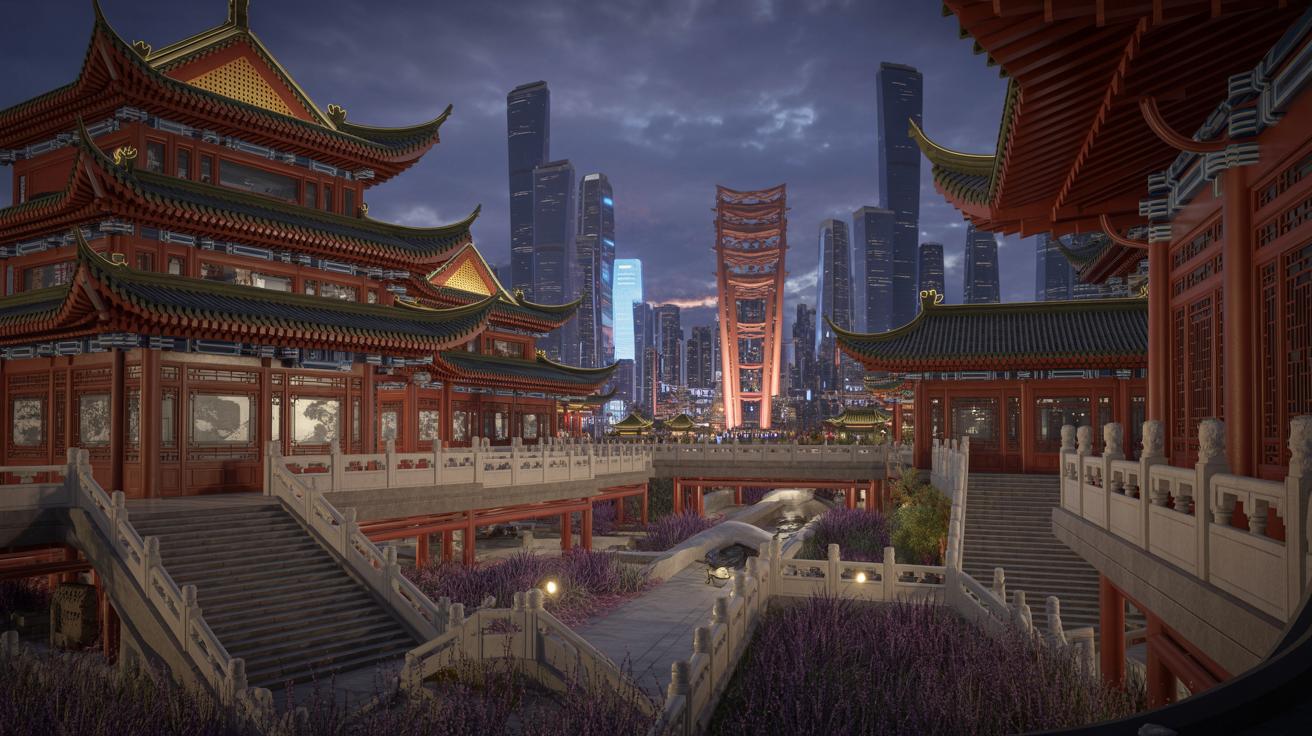What You Need to Know
- 🌟 Chinese sci-fi is gaining global attention by blending traditional cultural elements with speculative futures.
- 📚 Liu Cixin’s “The Three-Body Problem” has become a global cultural phenomenon, with adaptations into films and a Netflix series.
- 🧠 Authors like Wu Yan are using ancient literature and philosophies to create narratives that resonate on both local and international levels.
- 🎥 Works such as “The Wandering Earth” showcase Chinese philosophical values through blockbuster movie adaptations.
- 🌐 The genre offers a distinctive Chinese perspective on global challenges, reflecting current technological revolutions and social transformations.
In recent years, Chinese science fiction has emerged as a powerful cultural force, ingeniously blending traditional elements with futuristic visions. This unique genre has captivated audiences worldwide, offering fresh perspectives on age-old themes and showcasing the rich tapestry of Chinese heritage. As the country’s sci-fi creators delve into the depths of their cultural history, they are crafting stories that are not only entertaining but also deeply thought-provoking. These narratives invite readers to explore the possibilities of the future while remaining firmly rooted in the wisdom of the past.
The Rise of Chinese Sci-Fi
The global spotlight on Chinese science fiction has intensified, particularly with the success of works like Liu Cixin’s “The Three-Body Problem.” This groundbreaking trilogy fuses historical and philosophical motifs with universal themes of science and survival, capturing the imagination of readers around the globe. The series has become a global cultural phenomenon, further amplified by its translation into numerous languages and adaptations into films and television, including a popular Netflix series. As a result, the total revenue of China’s sci-fi industry soared to an impressive $15.17 billion in 2024, highlighting the genre’s burgeoning popularity.
Beyond commercial success, Chinese sci-fi is recognized for its distinctive approach to storytelling. Writers like Wu Yan are mining the depths of ancient literature and philosophies to create narratives that resonate on both local and international levels. This approach is a testament to the genre’s ability to weave the past with speculative futures, offering a distinctly Chinese lens on global issues. As such, Chinese science fiction is not simply a niche category but a vital component of the broader cultural landscape.
Traditional Culture Meets Futuristic Vision
One of the most intriguing aspects of Chinese sci-fi is its seamless integration of traditional cultural elements with futuristic themes. Authors like Wu Yan are at the forefront of this movement, using their works to highlight the enduring relevance of ancient wisdom in modern contexts. Wu’s short story “Dad’s Sticky Notes,” which won the gold at the sixth Children’s Science Fiction Nebula Awards of China, exemplifies this trend. The tale follows a young boy using time-traveling sticky notes to explore ancient archaeological sites, blending historical imagination with a futuristic flair.
Through such narratives, authors encourage readers to appreciate the wisdom encapsulated in ancient Chinese culture. This wisdom is not a relic of the past but a vibrant source of inspiration that can drive technological innovation. By drawing from traditional literature, philosophies, and archaeological marvels, Chinese sci-fi creators are crafting stories that are unmistakably Chinese yet universally accessible. This fusion of the old and the new not only enriches the genre but also offers fresh insights into the challenges and opportunities of the future.
Influence of Iconic Works
Chinese sci-fi’s appeal is further enhanced by its ability to reinterpret iconic works within a speculative framework. Classics like “Journey to the West” serve as a rich reservoir of inspiration for contemporary writers. This epic, with its dynamic interplay between deities, demons, and humans, exemplifies how traditional aesthetics can inspire modern narratives. Wu Yan and other authors view such works as more than mere cultural artifacts; they are dynamic sources of creativity that resonate with today’s audiences.
The influence of these iconic works extends beyond narrative inspiration. They also offer a blueprint for exploring complex themes such as artificial intelligence and space exploration. By integrating unique thoughts derived from 5,000 years of civilization, Chinese sci-fi offers distinctive answers to global challenges. These narratives strike a chord with readers worldwide, reflecting current technological revolutions and social transformations through a uniquely Chinese perspective.
Global Impact and Future Prospects
The global impact of Chinese science fiction is undeniable. As the genre continues to gain traction, its influence extends beyond literature to film, television, and other media. Works like Liu Cixin’s “The Wandering Earth” have been adapted into blockbuster movies, showcasing Chinese philosophical values on a grand scale. The premise of moving Earth itself to ensure humanity’s survival is a testament to the deep-seated cultural bond between people and their homeland.
As Chinese sci-fi continues to evolve, it is poised to play an increasingly significant role in shaping global cultural narratives. Its unique blend of traditional wisdom and futuristic vision offers a fresh perspective that resonates with audiences worldwide. As the world grapples with rapid technological advancements and social changes, Chinese sci-fi provides a compelling lens through which to explore these challenges. The genre’s future prospects are bright, promising to offer even more innovative and thought-provoking stories in the years to come.
As Chinese science fiction continues to captivate readers around the world, it raises important questions about the role of culture in shaping our understanding of the future. How will this unique blend of traditional wisdom and futuristic vision influence global perspectives on innovation and creativity? Will other cultures embrace similar approaches, or will Chinese sci-fi remain a distinct cultural phenomenon? As we look to the future, the answers to these questions may redefine the landscape of global storytelling.
Did you like it?4.6/5 (24)







8 comments
sofia_sapphire
Thank you for this insightful post. It’s fascinating how ancient philosophies can provide fresh perspectives on modern challenges.
Christian
Did anyone else start imagining using sticky notes for time travel after reading about that short story? I need those notes now!
thomas
This article was tea-riffic! 🐉 I’ve always loved how dragons and other mythical elements are woven into modern stories.
faith2
I’m curious, do these authors get inspired by other international sci-fi works, or is it mostly rooted in their own cultural history?
Madison
Great read! How do you think Chinese sci-fi will influence Western storytelling in the future?
diegomonolith
Is it just me, or does “The Wandering Earth” sound like a wild road trip movie but with a WHOLE planet? 😂
ElijahWhispering
Thanks for sharing! I never realized how much ancient wisdom could impact futuristic storytelling. It’s like time travel but with words!
Leo2
Wow, this post just opened my eyes to the world of Chinese sci-fi! I’ve only read “The Three-Body Problem” so far. Any other recommendations? 😊